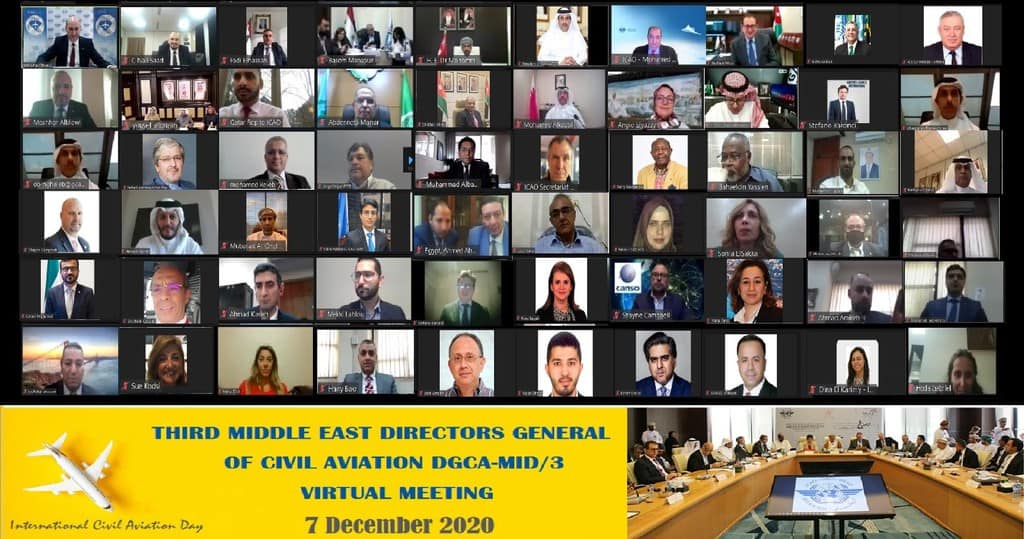The COVID-19 pandemic has hit the entire aviation industry hard. ICAO’s Middle East (MID) Regional Office continues to support States in the Region as they respond to the challenges of the pandemic. In December, the Heads of Civil Aviation Authorities in the MID Region and International/Regional Organizations were invited to attend the Third Directors General of Civil Aviation within the Middle East Region (DGCA-MID). The virtual event brought them together to discuss global, regional and national developments related to COVID-19, including the measures taken by States to reduce the risk of spread of COVID-19 and protect the health of air travelers and aviation personnel, as well as the measures taken to ensure the safety, security and sustainability of the air transport operation.

A message from Dr. Fang Liu, ICAO’s Secretary General, was presented at the beginning of the meeting. She thanked the MID Region for the outstanding commitment and efforts in addressing the challenges caused by the pandemic in a cooperative and collaborative manner and she commended the MID Office for providing timely updates, support and guidance as part of ICAO’s ongoing strategy and response in the recovery from the crisis.
Mr. Mohamed Smaoui, the Acting Regional Director opened the meeting by welcoming all participants and expressing his sincere appreciation to the Director Generals. As the event was held on December 7th, he congratulated everyone on the occasion of International Civil Aviation Day.
 Mr. Rahma, Director of the Air Transport Bureau, provided an overview of civil aviation after COVID-19, highlighting the impact of the crisis on the air transport system both from the operational side (impact on the volume of activities) and economical side (loss of revenues by the industry: Airlines, Airports, ANSPs, etc.).
Mr. Rahma, Director of the Air Transport Bureau, provided an overview of civil aviation after COVID-19, highlighting the impact of the crisis on the air transport system both from the operational side (impact on the volume of activities) and economical side (loss of revenues by the industry: Airlines, Airports, ANSPs, etc.).
The DGs and Heads of Delegations provided remarks and introductions, including high-level briefings on the latest national developments related to their own civil aviation systems and the impact of the COVID-19 crisis. They expressed their appreciation for the collaboration of the ICAO MID Office with States and all stakeholders in the recovery.
Discussions centered on the latest developments related to COVID-19 at the regional level including the regional implementation status of CART Phase I & II. Key activities in the Region were also highlighted with a view to ensuring a well-coordinated and harmonized implementation of the measures to support the restart and recovery of the aviation system in the MID Region, as presented by Mr. Mohamed Smaoui.
The presence of the International and Regional Organizations in the meeting was crucial. The Arab Air Carriers Organization (AACO), the Arab Civil Aviation Organization (ACAO), and the International Air Transport Association (IATA) provided some recommendations to support the recovery of the Air Transport Sector. They illustrated what is “Travel is safe”, and invited States to follow the Risk Assessment Strategy in the ICAO Testing and Cross-border Risk Management Measures Manual. It was noted that the updates to the CART Phase 2 Guidelines are very useful and could be enhanced.
Airports Council International (ACI) Asia-Pacific delivered a presentation highlighting the ACI initiatives to ensure compliance by the airports (Airport Health Accreditation and Airport Health Measures Audit Programme). ACI Confirmed in this respect that they had accredited six airports in the MID Region.
In the presentation IATA delivered (on the Travel Pass initiative), they highlighted the following benefits:
- Universal: built to meet passenger, government and airline needs
- Proven: based on existing IATA solutions
- Modular: airlines can choose modules supporting their strategy
- Trust Framework: partner for mutual benefit
- Decentralized technology: no central passenger database
- Interoperable: open standards and open networks
- Sustainable: additional data-sets required for travel can be easily integrated into app based on a combination of four modules that are interoperable and open access
In this virtual event a total of ninety-nine (99) participants from fourteen (14) States (Bahrain, Egypt, Iran, Iraq, Jordan, Kuwait, Lebanon, Oman, Qatar, Saudi Arabia, Sudan, Syria, UAE, and Yemen) and nine (9) Organizations (AACO, ACAO, ACI, AFCAC, CANSO, IATA, IFALPA, IFATCA and ICAO) participated.

